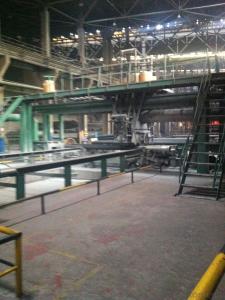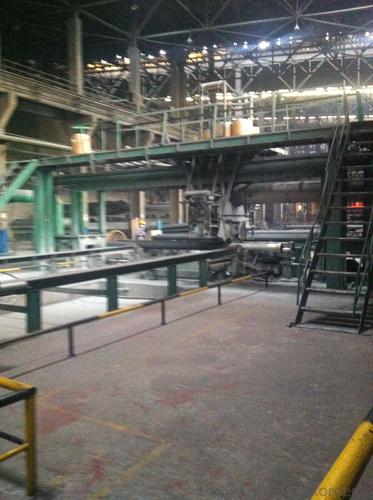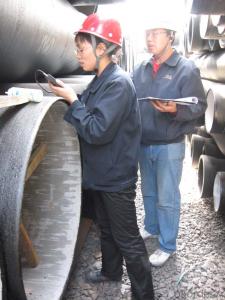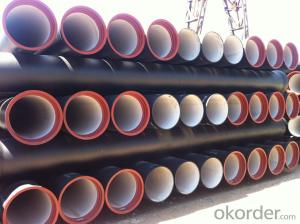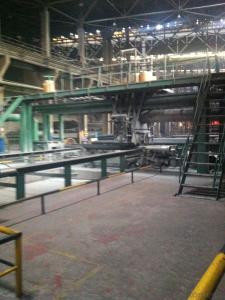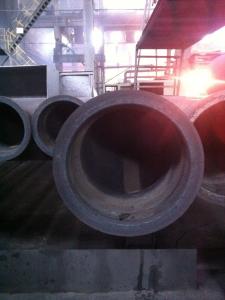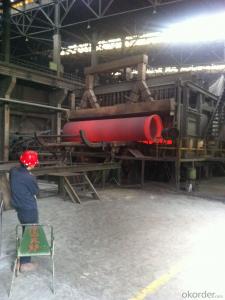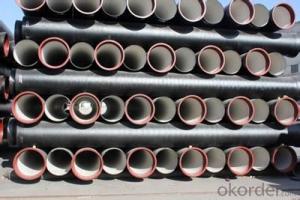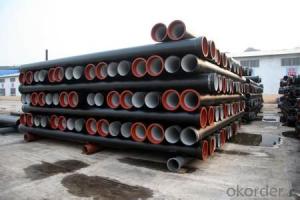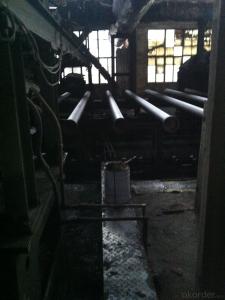DUCTILE IRON PIPES AND PIPE FITTINGS K9 CLASS DN800
- Loading Port:
- Tianjin
- Payment Terms:
- TT OR LC
- Min Order Qty:
- 22 pc
- Supply Capability:
- 3000 pc/month
OKorder Service Pledge
OKorder Financial Service
You Might Also Like
Material : Ductile Cast Iron
Size Range : DN 80mm to DN 2000mm
Unit Effective Length : 6m or 5.7m
Manufacture Standard: ISO 2531:1998/ EN 545:2006/EN 598:2007
Annual capacity : 200,000 tons
Coating Exterior: Zinc 130g/m2 according to ISO 8179-1 and bitumen coating 70 microns.
Cement Interior: Portland Cement/ High Alumina Cement/ Sulphate Resisting Cement Lining according to ISO 4179
Special requirements on external coating and internal lining can be applied
We also provide accessories such as SBR/EPDM rubber gaskets, lubricant paste, pipe caps, PE sleeves, etc.
Additional Parts:
Each pipe is strictly inspected according to related standard to ensure permanently high performance.
Easy Installation at site and service free for life
Long Service Lifespan
Quotation will arrive you within 24hours once we get your inquiry.
We guarantee offering you a competitive price.
A copy of original inspection reports of pipes will be offered after shipment.
Photos of loading process will be sent to the customer after shipment effect.
We will follow-up the delivery progress after shipment effect and update to the customer on weekly basis.
- Q: It's not easy to drill ductile iron with cobalt high speed steel bit. Please help to point it out
- Choose carbide or whole carbide drill, about 90HRC in hardness. But it requires a high number of drills, around 3000.
- Q: Can ductile iron pipes be used for bridge piers?
- Bridge piers can indeed utilize ductile iron pipes. These pipes possess remarkable strength and durability, rendering them suitable for various purposes, bridge construction included. Their resistance to corrosion is exceptional, and they withstand heavy loads with ease, making them a dependable choice for supporting bridge piers. Moreover, ductile iron pipes offer convenient installation and maintenance, which can be advantageous in bridge construction endeavors. Nonetheless, it is crucial to account for the specific requirements and design specifications of the bridge prior to selecting ductile iron pipes as the material for its piers. Thorough engineering evaluation and consideration of factors like load capacity, soil conditions, and environmental elements are indispensable for guaranteeing the suitability and safety of employing ductile iron pipes for bridge piers.
- Q: Can ductile iron pipes be used in high-temperature applications?
- Yes, ductile iron pipes can be used in high-temperature applications. Ductile iron has excellent heat resistance properties, with a maximum recommended operating temperature of around 450 degrees Fahrenheit. This makes it suitable for a wide range of industrial and commercial applications where high temperatures are involved, including steam, hot water, and thermal oil systems.
- Q: How can 4 inch ductile iron pipe be connected with 2 inch galvanized pipe?
- The general electric welded steel pipe for clarinet.
- Q: How can the connection of ductile iron pipe elbow be convenient for connecting?
- Ductile cast iron pipe in the groove pipe connection technology is also called the lathedog connection technology, has become the most liquid and gas pipeline connection technology, although this technology is later than foreign in domestic development time, but because of its advanced technology, domestic market quickly received. Since 1998, it has been developed and applied in just a few years. It has gradually replaced two traditional ways of pipe connection, such as flange and welding. Not only technically more mature, the market is generally recognized, but also by the national laws and regulations actively guide the policy. The application of grooved pipe connection technology makes the complex pipe connection procedure simple, fast and convenient. Took a big step forward in pipeline connection technology.
- Q: Ductile iron pipe connection mode
- Jack painted on the outer surface and rubber lubricant: lubricant evenly installed ring inner surface, outer surface coating in the socket to socket socket parts lubricant line all the brush in the socket.
- Q: What is the expected hoop stress capacity of ductile iron pipes?
- The expected hoop stress capacity of ductile iron pipes varies depending on the size and class of the pipe. However, ductile iron pipes typically have a high expected hoop stress capacity due to their robust and flexible nature, making them suitable for handling high-pressure applications.
- Q: How do ductile iron pipes handle ground settlement due to construction activities?
- Ductile iron pipes have the ability to handle ground settlement caused by construction activities due to their flexibility and strength. These pipes are designed to withstand external pressure and can accommodate minor ground movements without significant damage or failure. The ductility of the material allows the pipes to deform slightly, absorbing the ground settlement and preventing them from cracking or breaking. Additionally, the joints in ductile iron pipes are typically flexible, allowing for further movement and reducing the risk of leakage or structural issues. Overall, ductile iron pipes are well-suited for withstanding ground settlement and ensuring the integrity of the pipeline system during construction activities.
- Q: How are ductile iron pipes protected against stray electrical currents?
- Ductile iron pipes, which are commonly used for water and sewer systems, are protected against stray electrical currents through a process known as cathodic protection. This method involves applying a low-voltage direct current (DC) to the pipes, which creates a protective electrical field around them. Cathodic protection is achieved by installing sacrificial anodes or impressed current systems near the ductile iron pipes. Sacrificial anodes, typically made of a more electrically active metal such as zinc or magnesium, are connected to the pipes and serve as the source of electrical current. These anodes corrode over time, sacrificing themselves to protect the pipes from corrosion due to stray electrical currents. Impressed current systems, on the other hand, utilize an external power source to supply the protective electrical current. Rectifiers are used to convert alternating current (AC) to direct current (DC) and the DC is then applied to the pipes through anodes. This method allows for more control over the amount of current being applied, ensuring optimal protection. In both cases, the electrical current flowing through the sacrificial anodes or impressed current systems creates a protective barrier around the ductile iron pipes. This barrier prevents the stray electrical currents from flowing through the pipes, reducing the risk of corrosion and extending the lifespan of the infrastructure. Regular monitoring and maintenance of the cathodic protection system are essential to ensure its effectiveness. This involves inspecting the anodes, checking the electrical current levels, and making any necessary adjustments or replacements to maintain the desired level of protection. Overall, cathodic protection is a reliable and widely used method to protect ductile iron pipes against stray electrical currents, safeguarding the integrity and longevity of water and sewer systems.
- Q: Can ductile iron pipes be used for water treatment facilities?
- Yes, ductile iron pipes can be used for water treatment facilities. Ductile iron is a type of cast iron that has enhanced strength, flexibility, and durability. These properties make it suitable for use in various applications, including water treatment facilities. Ductile iron pipes have excellent corrosion resistance, which is crucial in water treatment facilities where the pipes come in contact with different chemicals and water contaminants. They can withstand the harsh conditions and chemicals found in water treatment processes, ensuring a long service life. Moreover, ductile iron pipes have high tensile strength and are capable of withstanding high pressure. This makes them suitable for carrying the water throughout the facility, including the distribution system, pumping stations, and treatment units. They can handle the required flow rates and pressures without compromising the integrity of the pipes. In addition, ductile iron pipes are known for their flexibility and resilience. They can withstand ground movement and other external stresses, minimizing the risk of pipe failures and leaks. This is important in water treatment facilities where pipes often pass through different terrains and undergo frequent maintenance activities. Furthermore, ductile iron pipes are cost-effective compared to other alternative pipe materials like steel or PVC. They have a long life span, require minimal maintenance, and have low failure rates, reducing the overall operational and maintenance costs for water treatment facilities. Overall, ductile iron pipes offer a reliable and durable solution for water treatment facilities. Their corrosion resistance, high tensile strength, flexibility, and cost-effectiveness make them a suitable choice for transporting water and chemicals within the facility, ensuring efficient and effective water treatment processes.
Send your message to us
DUCTILE IRON PIPES AND PIPE FITTINGS K9 CLASS DN800
- Loading Port:
- Tianjin
- Payment Terms:
- TT OR LC
- Min Order Qty:
- 22 pc
- Supply Capability:
- 3000 pc/month
OKorder Service Pledge
OKorder Financial Service
Similar products
Hot products
Hot Searches
Related keywords
